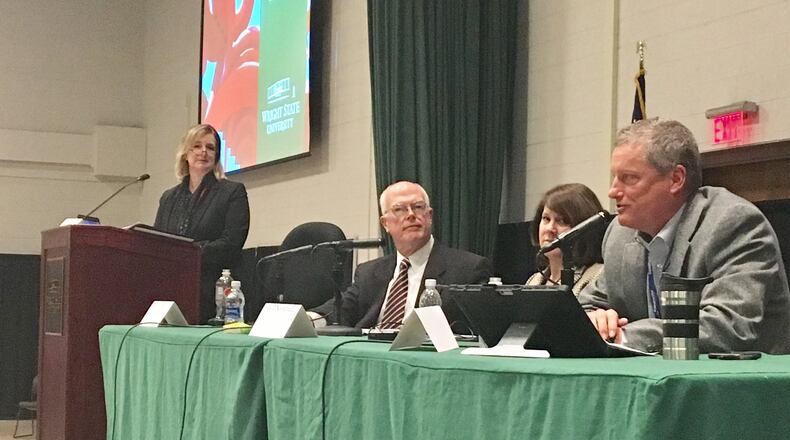But Wright State reached a $1 million non-prosecution agreement with the U.S. Attorney’s Office in November and the school appears to be on track to avoid state fiscal watch, an outcome president Cheryl Schrader said was unthinkable at this time last year.
“We have made some big strides,” Schrader said. “I don’t know that any of us would have guessed we’d be where we are, but I think that has really given people a boost of confidence and a feeling that they are part of a solution.”
» INVESTIGATION: Local hospitals, universities invest millions in off-shore tax havens
‘Not out of the woods’
The school still faces significant challenges heading into 2019. Although the federal probe has ended, the university must use an outside attorney to audit its H-1B visa process for the next two years, according to the agreement.
The school’s finances will undergo continued vigilance as well. To avoid backsliding into more financial hot water, WSU’s 2019 budget calls for $3 million to be added to the school’s reserves by July.
“I’m really pleased with where we are on that,” said Doug Fecher WSU board of trustees chairman. “But we have to continue to watch (our finances). While I do agree we’ve turned a corner, we’re not out of the woods yet.”
Major challenges
Declining enrollment and a contract agreement are two major challenges that await.
Administrators hope to reach a deal on a contract with the faculty union in the new year, something that’s evaded them for close to a year and a half. Members of the Wright State chapter of the American Association of University Professors have threatened to strike if a deal isn’t reached.
Enrollment, too, will continue to be a focal point.
Wright State’s total enrollment was projected to dip below 17,000 students last fall for the first time since 2007, continuing years of declines. Tuition is often the largest single source of revenue for colleges, meaning declines in enrollment translate to less funding.
» RELATED: SOCHE president to take new job at another higher ed organization
“We really need to keep working on enrollment and retention,” Fecher said. “All of that is centered around the revenue side of the equation. I really feel good that we’re in a place that we can begin thinking about those things.”
Revised mission
Schrader and her administration are looking forward to completing a strategic plan next year that will be in place through 2025. Though the plan is waiting on an endorsement from Wright State’s faculty senate and still needs approval from the board of trustees, the administration is already starting to implement parts of it, Schrader said.
The plan will provide a revised mission and vision for Wright State and it calls for redesigning the university’s student transfer process, expanding online course offerings and strengthening partnerships with the military, among other things. Schrader has been working with WSU students, faculty and staff on creating the plan since she tool office in July 2017.
“I think 2019 is a year of possibilities,” Schrader said. “I’m very eager to move into 2019 and begin implementing in full our strategic plan, continuing to improve our financial outlook and really begin to focus on our growth strategy.”
FIVE FAST READS
• WSU may face more scrutiny despite deal on federal visa investigation
• Heating costs could spike this winter as natural gas prices increase
• EXPERT: Wright-Patterson ‘crucial to avoiding a defeat if there’s a World War III,’
• UD president gets contract renewed for 5 years
• UD, Premier give former fairgrounds new name, redevelopment could start in 3 to 4 years
About the Author
